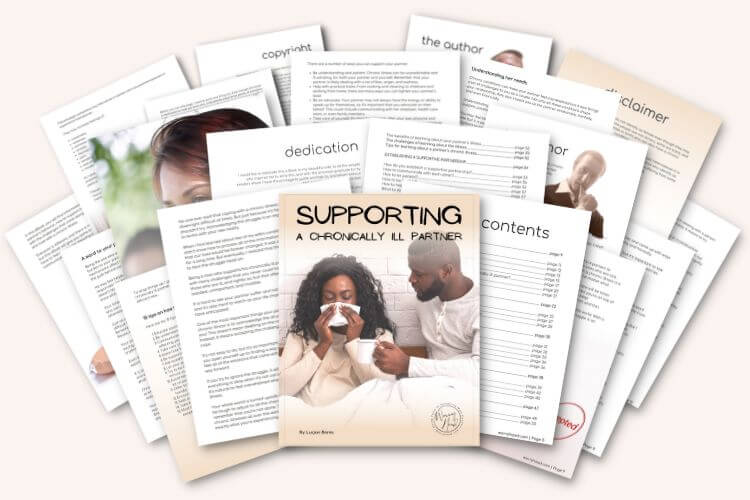How to acknowledge my partner’s long-term illness?
Accepting the new normal with a long-term illness can be tough for your loved one, but how to acknowledge partner’s long-term illness if you aren’t suffering from it yourself?
Acknowledging partner’s long-term illness has plenty of benefits, but before I get to that, it’s important for you to remember that your partner is still the same person they were before their diagnosis.
Nevertheless, there are a few things you can do to show your support and love.
First, try to learn as much about your partner’s illness as you can. This will help you understand what they are going through and how you can best support them. You can also ask them how they would like you to be involved in their care.
Second, make sure to express your love and support frequently. Let them know that you are there for them and that you will do whatever you can to help them through this difficult time.
Finally, try to be understanding and patient when things are tough. Be prepared for setbacks and good days alike. Remember that your partner is going through a lot, and they need your love and support more than ever.
How to acknowledge your partner’s long-term illness?
Show genuine concern and care for your partner by learning about the illness to understand what they are going through. Communicate, help out around the house, express your love frequently. Be patient when things are tough, and be a shoulder to cry on.
To give you more detailed advice on how to acknowledge your partner’s long-term illness, I listed below 15 ways how to acknowledge partner’s chronic illness:
- Show genuine concern and care for your partner.
- Take the time to learn about their illness.
- Communicate with your partner regularly about their condition.
- Help out around the house or with errands whenever you can.
- Make sure to express your love and support frequently.
- Be understanding and patient when things are tough.
- Offer to go to doctor’s appointments with your partner.
- Help research treatments or options.
- Be a shoulder to cry on.
- Take care of yourself both physically and mentally.
- Join a support group for caregivers of chronically ill patients.
- Seek out counseling if you are having a hard time coping with your partner’s illness.
- Lean on your friends and family for support.
- Find an activity or hobby that helps you relax and de-stress.
- Don’t be afraid to ask for help when you need it.
If you were interested in learning how to support your partner who has a chronic condition, I wrote a book for that purpose. You can get the 1st Chapter of “Supporting a Chronically Ill Partner” for FREE, and if you like it, you’ll get a whopping 33% discount on the whole book!
The freebie includes the following:
- A word to your partner.
- A word to you.
- Stepping on eggshells.
- Understanding her needs.
- How to acknowledge having a chronically ill partner?
- Acknowledging can be hard.
- 15 tips on how to do it!
Get the 1st Chapter FREE!
Chronic Illness for Partners

More details on acknowledging partner’s long-term illness.
Show genuine concern and care for your partner. Be there for them when they need you the most. It is important to show your partner that you care about them and their condition. Be there for them when they need you and offer your support however you can.
Take the time to learn about their illness. This will help you understand what they are going through and how best you can support them.
Learning about your partner’s illness will help you better understand their condition and how to best support them. You can ask them questions about their illness, research it online, or talk to their doctor to learn more.
Communicate with your partner regularly about their condition. This will help keep lines of communication open and allow you to be on the same page with each other. It is important to communicate with your partner about their condition on a regular basis.
This will help you stay up-to-date on their condition and allow you to better support them. You can ask them how they are feeling, what their symptoms are, and how their treatments are going.
Help out around the house or with errands whenever you can. This takes some of the load off of your partner and lets them know you are willing to help out however you can.
Whenever you have some free time, offer to help out around the house or run some errands for your partner. This will take some of the burdens off of them and let them know you are willing to help.
Make sure to express your love and support frequently. Your partner needs to know that you are there for them and that you will do whatever you can to help them through this difficult time. And difficult times will come and go, but your love and support will be a constant source of strength for them.
Be understanding and patient when things are tough. There will be good days and bad days, so be prepared for both. Remember that your partner is going through a lot and they need your love and support more than ever.
On the good days, enjoy your time together and make the most of it. On the bad days, be understanding and patient. This is a difficult time for both of you and it is important to be there for each other.
Attend doctor’s appointments with your partner. This shows that you are supportive and interested in their care, and can help lessen some of the anxiety that comes with medical appointments. Your partner is going to feel comfortable with it because you dhow that you want to be involved in their treatment.
Help research treatments or options that may be available to your partner. This shows that you are willing to do whatever it takes to help them find relief from their illness. That is going to help a lot because it can be difficult to find information on treatments or options.
Be a shoulder to cry on when needed. Sometimes, all your partner needs is a good cry and a listening ear. Be there for them when they need to let it all out. My wife often does that, she literally leans on my shoulder and cries. You don’t have to do anything, simply being there is enough.
Make sure to take care of yourself, too. This is a difficult time for both of you and it is important to make sure you are taking care of yourself, too.
This includes getting enough sleep, eating a balanced diet, and exercising regularly. Take care of yourself both physically and mentally. In order to be there for your partner, you need to take care of yourself as well.
Join a support group for caregivers of chronically ill patients. This can provide you with advice, support, and understanding from others who are in similar situations.
Joining a support group for caregivers of chronically ill patients can be a great way to get advice and support from others who are going through similar situations. This can be a great resource for you as you navigate this new phase of your relationship.
Seek out counseling if you are having a hard time coping with your partner’s illness. This is nothing to be ashamed of and can be a great way to get some extra support. If you are finding it difficult to cope with your partner’s illness, seek out counseling.
This is a perfectly normal thing to do and can be a great way to get some extra support. A counselor can help you work through your feelings and give you tools to deal with the stress of your situation.
Lean on your friends and family for support. They can be a great resource when things are tough.
Friends and family can be a great source of support when you are dealing with your partner’s illness. Lean on them for help and advice when you need it.
Most probably your partner’s illness will reveal who are your true friends, but still, those who are there for you in the tough times are worth keeping around.
Take some time for yourself. Make sure to schedule in some “me time” to do things that make you happy.
It is important to take some time for yourself amidst all of this. Make sure to schedule some time to do things that make you happy and help you relax.
This can be anything from reading, gardening, hiking, going to the gym, or spending time with friends and family. Whatever it is, make sure it is something that you enjoy and that helps you take your mind off of things for a while.
Be patient with yourself and your partner. Everyone copes with chronic illness in different ways and it takes time to adjust to the new normal. It is important to be patient with yourself and your partner as you both cope with this new situation.
Everyone deals with chronic illness in different ways and it takes time to adjust to the new normal. Give yourselves grace and understanding as you navigate this new phase of your relationship.
Lastly, don’t be afraid to ask for help when you need it. There is no shame in admitting that you need assistance. Whether it is from friends, family, or a professional, getting help when you need it is okay.

The new normal with long-term illness.
Acceptance of the new normal with long-term illness is key.
This means acknowledging that things will be different from now on and that there is no going back to the way things were before. It can be difficult to come to terms with this, but it is important to remember that you are not alone. There are others who are dealing with similar situations and there is support available.
Acknowledge your partner’s long-term illness early on and be honest about the fact that things will be different from now on.
This doesn’t mean that you have to go into detail about the illness, but acknowledging that it exists and that it will impact your relationship is important. This can be a difficult conversation to have, but it is an important one nonetheless.
The new normal with long-term illness is acknowledging that things will be different from now on.
This means accepting the fact that your partner’s illness will impact your relationship in some way. It can be difficult to come to terms with this, but it is important to remember that you are not alone. There are others who are dealing with similar situations and there is support available.
Final thoughts…
Taking into account all you’ve read, try to remember a few key things:
- Acknowledge your partner’s long-term illness early on and be honest about the fact that things will be different from now on.
- This doesn’t mean that you have to go into detail about the illness, but acknowledging that it exists and that it will impact your relationship is important.
- The new normal with long-term illness is acknowledging that things will be different from now on.
- This means accepting the fact that your partner’s illness will impact your relationship in some way.
- It can be difficult to come to terms with this, but it is important to remember that you are not alone. There are others who are dealing with similar situations and there is support available.
If you or your partner are dealing with a chronic illness, know that you are not alone. There is support available and things can and will get better. Acknowledge the situation, be honest about the changes that need to be made, and take things one day at a time.
I hope this article was helpful. If you have any questions or would like to share your own experiences, please feel free to leave a comment below.
And remember about the book I designed especially for people like you, to provide support and guidance every step of the way: “Supporting a Chronically Ill Partner”.
Check it out!


About Me
Hi, I’m Lucjan! The reason why I decided to create this blog was my beautiful wife, who experienced a lot of pain in life, but also the lack of information about endometriosis and fibromyalgia for men…
